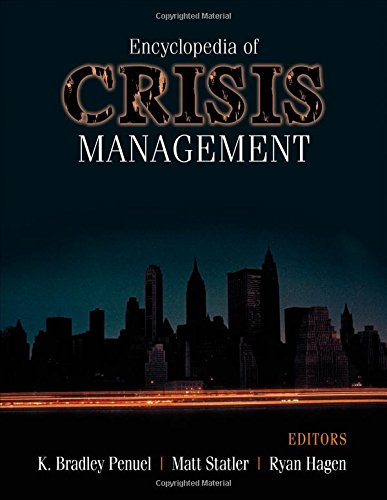Encyclopedia Of Crisis Management 1st Edition K Bradley Penuel by K. Bradley Penuel, Matt Statler, Ryan Hagen 9781452226125, 1452226121 instant download after payment.
Although now a growing and respectable research field, crisis management―as a formal area of study―is relatively young, having emerged since the 1980s following a succession of such calamities as the Bhopal gas leak, Chernobyl nuclear accident, Space Shuttle Challenger loss, and Exxon Valdez oil spill. Analysis of organizational failures that caused such events helped drive the emerging field of crisis management. Simultaneously, the world has experienced a number of devastating natural disasters: Hurricane Katrina, the Japanese earthquake and tsunami, etc. From such crises, both human-induced and natural, we have learned our modern, tightly interconnected and interdependent society is simply more vulnerable to disruption than in the past. This interconnectedness is made possible in part by crisis management and increases our reliance upon it. As such, crisis management is as beneficial and crucial today as information technology has become over the last few decades.
Crisis is varied and unavoidable. While the examples highlighted above were extreme, we see crisis every day within organizations, governments, businesses and the economy. A true crisis differs from a "routine" emergency, such as a water pipe bursting in the kitchen. Per one definition, "
it is associated with urgent, high-stakes challenges in which the outcomes can vary widely (and are very negative at one end of the spectrum) and will depend on the actions taken by those involved." Successfully engaging, dealing with, and working through a crisis requires an understanding of options and tools for individual and joint decision making. Our
Encyclopedia of Crisis Management comprehensively overviews concepts and techniques for effectively assessing, analyzing, managing, and resolving crises, whether they be organizational, business, community, or political. From general theories and concepts exploring the meaning and causes of crisis to practical strategies and techniques relevant to crises of specific types, crisis management is thoroughly explored.
Features & Benefits:
- A collection of 385 signed entries are organized in A-to-Z fashion in 2 volumes available in both print and electronic formats.
- Entries conclude with Cross-References and Further Readings to guide students to in-depth resources.
- Selected entries feature boxed case studies, providing students with "lessons learned" in how various crises were successfully or unsuccessfully managed and why.
- Although organized A-to-Z, a thematic "Reader's Guide" in the front matter groups related entries by broad areas (e.g., Agencies & Organizations, Theories & Techniques, Economic Crises, etc.).
- Also in the front matter, a Chronology provides students with historical perspective on the development of crisis management as a discrete field of study.
- The work concludes with a comprehensive Index, which―in the electronic version―combines with the Reader's Guide and Cross-References to provide thorough search-and-browse capabilities.
- A template for an "All-Hazards Preparedness Plan" is provided the backmatter; the electronic version of this allows students to explore customized response plans for crises of various sorts.
- Appendices also include a Resource Guide to classic books, journals, and internet resources in the field, a Glossary, and a vetted list of crisis management-related degree programs, crisis management conferences, etc.


